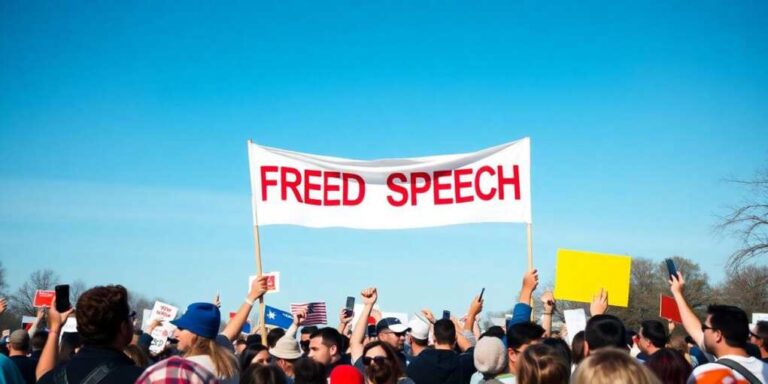
A controversial bill awaiting California Democratic Gov. Gavin Newsom’s signature would slap steep new penalties on social media platforms that fail to censor content deemed in violation of the state’s civil rights laws.
SB 771, which passed both chambers of the state legislature and was sent to Newsom’s desk recently, imposes fines of up to $1,000,000 on social media platforms that fail to remove content that violates the state’s civil rights laws.
Critics warn the measure will lead to sweeping censorship of lawful speech.
Lawmakers defended SB 771 by citing “rising incidents of hate-motivated harm,” including “hate crimes involving anti-immigrant slurs.”
The bill’s text also references data from the Human Rights Campaign and the Center for Countering Digital Hate, showing a 400% rise in “anti-LGBTQ+ disinformation and harmful rhetoric on major social media platforms.”
“If people think platforms remove their content too much now, they should expect to see the pattern significantly intensify with this law,” Shoshana Weissmann, director of digital media at the R Street Institute, told the Daily Caller News Foundation.
“Rather than risk liability for showing users content one could argue (even if it doesn’t actually) violate a law, platforms will over-moderate and remove posts in order to stay out of court.”
Under the proposed law, platforms with $100 million or more in annual revenue could face $1 million in fines if they intentionally, knowingly, or willfully “relay” content that violates state law through their algorithms.
Companies found to be in reckless violation could face penalties of up to $500,000.
“Courts have recognized that algorithms are protected by the First Amendment, so punishing sites for using algorithms to deliver free speech would run into problems,” Weissmann said.
“Further, the law doesn’t limit which kinds of algorithms would cause platforms to be held liable for user speech. This means even showing content in the order it was posted would have this effect under the law, as ‘reverse chronological order’ is an algorithm.”
“The purpose of this act is not to regulate speech or viewpoint but to clarify that social media platforms, like all other businesses, may not knowingly use their systems to promote, facilitate, or contribute to conduct that violates state civil rights laws,” the bill states.
Yet opponents argue the law would inevitably drive platforms to remove lawful content out of fear of massive fines.
“By exposing these companies to civil liability for content they do not remove, SB 771 creates a chilling effect on their editorial discretion. The significant, prescribed civil penalties — potentially amounting to the billions for each violation — would lead platforms to over-remove lawful content to mitigate legal exposure,” the California Chamber of Commerce, the Computer and Communications Industry Association and TechNet wrote in their opposition to the bill.
“This violates the First Amendment rights of users and social media platforms,” they added.
Weissmann added that platforms may also find it challenging to differentiate sarcasm, serious posts and sincere discussions about sensitive subjects.
Adding that over-removing content will be the only way they will be able to avoid liability.
The bill has strong backing from the George Soros-funded Center for Countering Digital Hate, which has repeatedly advocated for the censorship of conservative outlets and figures.
In 2021, CCDH released a report called “The Toxic Ten” demanding Facebook and Google demonetize conservative sites such as The Daily Wire, Breitbart, Newsmax, The Washington Times and Media Research Center for spreading so-called climate “misinformation.”
Emails obtained by the House Judiciary Committee also revealed that the Biden White House used a separate CCDH called “Disinformation Dozen” to pressure Facebook to censor the accounts of those critical of vaccine guidelines.
The bill is supported by other groups that promote action against “disinformation,” including the California Initiative for Technology & Democracy, as well as over a dozen Jewish organizations.
However, it has also drawn opposition from a coalition on the left, including Voices for Justice in Palestine, the California chapter of the Council on American-Islamic Relations, Code Pink, IfNotNow California and Queers Undermining Israeli Terrorism.
If enacted, critics say SB 771 would likely face legal scrutiny under Section 230 of the Communications Decency Act, which shields platforms from being held liable for user-generated content.
California has been at the forefront of efforts to regulate so-called “hate speech,” though it has been forced to walk back some measures after constitutional challenges.
Recently, a federal court struck down two California laws after the satire site Babylon Bee filed suit.
The state agreed earlier this year to stop enforcing parts of a law that compelled platforms to disclose how they moderate what the statute described as “hate speech,” “extremism” or “disinformation.”
This followed a legal settlement with Elon Musk’s X Corp.
Meanwhile, Google, YouTube’s parent company, admitted this week that Biden administration officials repeatedly “pressed” it to remove video content that did not violate company policy.
But was nonetheless deemed by the administration to be “misinformation.”
Meta shut down its fact-checking program across Facebook and Instagram earlier this year.
This marked a victory for conservatives who long accused Meta’s third-party fact-checking partners of ideological bias and collusion with government agencies to suppress dissenting views.
This legislation represents California’s most aggressive attempt yet to control online speech through financial intimidation.
The million-dollar fines create an impossible situation where platforms must choose between bankruptcy and over-censorship.
Weissmann’s warning about platforms over-moderating to avoid liability exposes the bill’s true censorship purpose.
The involvement of Soros-funded organizations reveals the coordinated effort to silence conservative voices online.
Previous attempts to regulate online speech in California have been struck down by federal courts for violating the First Amendment.
The opposition from some left-wing groups shows even liberal organizations recognize the dangerous precedent this law would set.
The timing coincides with broader efforts by Democratic officials to pressure tech companies into censoring content they disagree with.
This bill would effectively deputize social media companies as state censors under threat of financial ruin.
The law’s broad language about algorithms could criminalize basic platform functions like showing posts in chronological order.
California’s pattern of passing unconstitutional speech restrictions shows their disregard for First Amendment protections.
The measure would likely face immediate legal challenges from both conservative and liberal civil liberties groups.
This represents the kind of government overreach that drove Elon Musk and other tech leaders to support Trump.
The law’s passage would set a dangerous precedent for other Democratic-controlled states to follow California’s censorship model.





